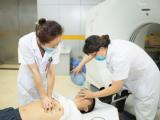Dec 23, 2004 (CIDRAP News) Although primarily associated with lung infection, the coronavirus that causes SARS (severe acute respiratory syndrome) spreads throughout the human body, Canadian researchers have found.
"We observed extrapulmonary dissemination of the virus into all major organs, especially the bowel and lymph nodes. These data have implications for the clinical manifestation, disease course and outcome, and transmission of SARS-CoV [SARS coronavirus]," says the report by Gabriella A. Farcas and colleagues of the University of Toronto and three other Toronto institutions.
Their study was published electronically in advance of the Jan 15, 2005, issue of the Journal of Infectious Diseases.
The study focused on victims of the SARS outbreak in the Toronto area from March to September of 2003. Autopsies were performed on 21 of 44 patients whose deaths were attributed to SARS. Fifty-one patients who died of other causes during the outbreak and underwent autopsies were used as controls.
Reverse-transcriptase polymerase chain reaction (RT-PCR) tests were used to detect SARS-CoV in organ samples.
The researchers found SARS-CoV in 19 of 19 patients who died within 51 days after the onset of infection. All 206 postmortem samples from the 51 non-SARS patients were negative for the virus.
Besides the lungs, the SARS virus was found in the small and large bowel, lymph nodes, spleen, liver, heart, kidney, and skeletal muscle of at least some patients. The virus was found in the small and large bowel in 73% (11 of 15) of patients, in the heart in 40% (7 of 18), and in skeletal muscle in 12% (2 of 17).
The authors note that watery diarrhea has often been reported as a SARS symptom. That observation and their own findings indicate that gastrointestinal involvement is common in SARS, which has "implications for infection-control measures and the potential for fecal-oral transmission in community outbreaks," the report says.
The findings partially parallel an earlier study in which Chinese researchers found the SARS-CoV in the intestinal tract, sweat glands, and kidneys of SARS victims, in addition to the lungs. That study, however, found no virus in the lymph nodes or muscles.
Farcas GA, Poutanen SM, Mazzulli T, et al. Fatal severe acute respiratory syndrome is associated with multiorgan involvement by coronavirus. J Infect Dis 2005 Jan 15:191(2):193-7 [Abstract]
See also:
May 10, 2004, CIDRAP News story, "Study suggests food, sweat, waste could spread SARS virus"




















